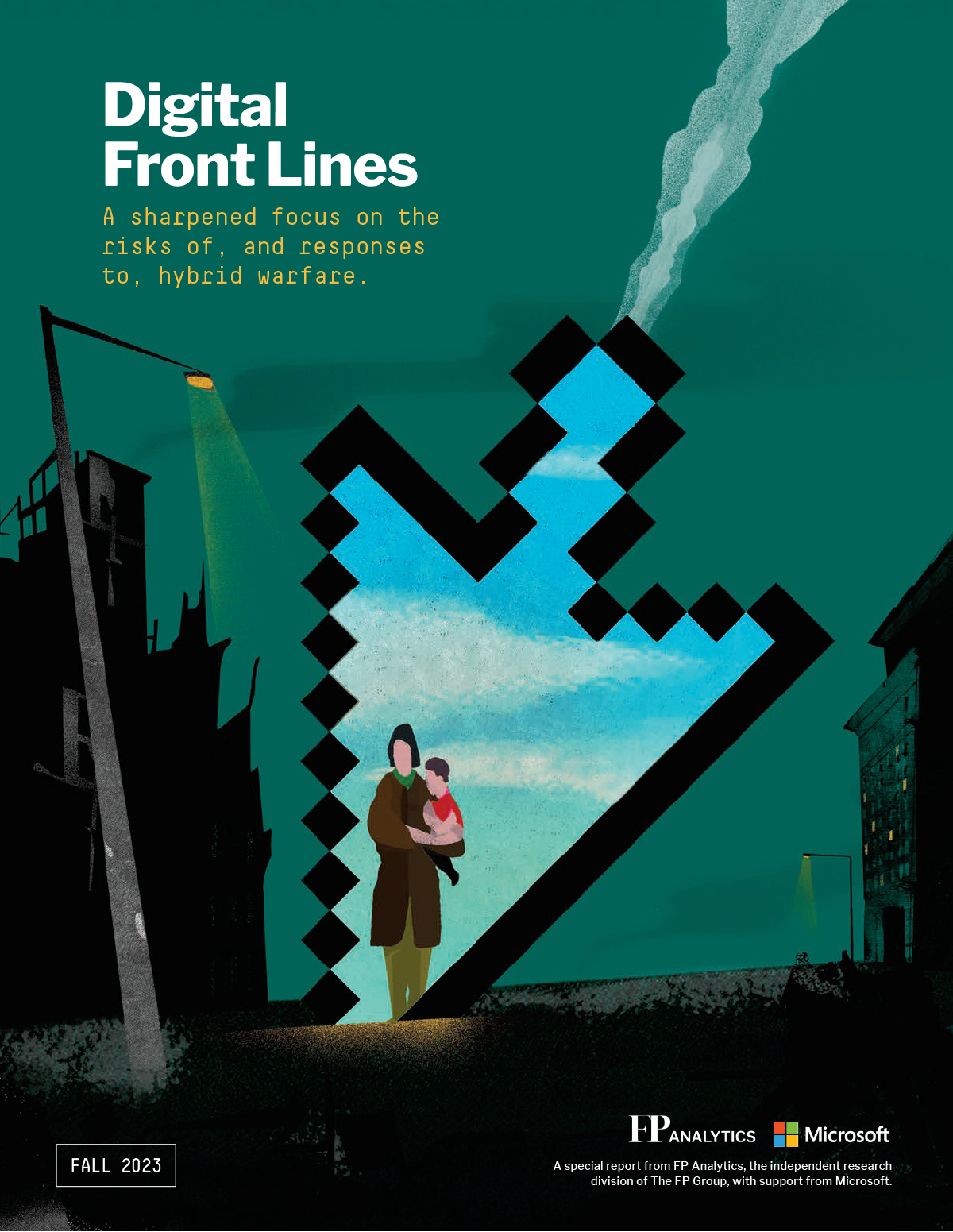Over the past few decades, nation-states have increasingly embraced the concept of hybrid warfare. Especially in situations short of open armed conflict, they are deploying cyberattacks, online influence operations, and other tech-enabled tactics to advance political goals and inflict harm on their adversaries. The war in Ukraine has led the United States and Europe to intensify their investment in hybrid warfare, but perhaps the most significant new developments have been the expanded roles played by Western technology companies and open-source researchers.
Over time, tech platforms have become important players in the international peace and security realm. With the war in Ukraine, a host of technology companies were on the front lines from the start and have turned into actors in hybrid warfare in their own right. Cyberattacks, a key feature of hybrid warfare, are aimed not only to cripple an adversary’s defenses but also to probe and identify vulnerabilities in preparation for a larger attack. Russia had significantly more potent cyber warfare capacity than Ukraine, but tech companies helped Ukraine combat Russia’s cyberattacks, transferred Ukrainian government data to remote servers to protect it from Russian airstrikes, and even provided free satellite internet coverage to soldiers and civilians behind enemy lines.
The immense public support for Ukraine after Russia’s invasion also enabled the Ukrainian government to crowdsource its cyber response. When Moscow knocked Ukrainian satellite systems offline, open-source intelligence researchers from around the world provided information on Russian troop movements by using Google maps and images circulating online. Volunteers analyzed the immense data generated by the war to collect and provide information, including documenting potential war crimes. Ukrainian civil society and diaspora collected donations online to buy drones and off-road vehicles to support their soldiers and lobbied financial companies to modify their policies to allow such transactions.
The involvement of global digital networks and tech companies in Ukraine is far greater than it was in the Syrian civil war—sometimes referred to as the first social media war—and in many other relatively recent conflicts, including those in Libya, Yemen, Ethiopia, and Myanmar. In the case of Syria, social media platforms grappled with thorny questions of content moderation but neither resolutely confronted disinformation campaigns nor protected opposition and civil society accounts. They did not archive digital records of war crimes in Syria, enabling users to delete incriminating evidence; courts later found that copies were inadmissible, because they could have been doctored. By contrast, the Ukrainian government persuaded Meta, Twitter, and TikTok to archive content to make it available to prosecutors pursuing war crimes cases in domestic, international, and foreign courts, which could help in holding perpetrators accountable.
Tech company participation in conflict- and atrocity-prevention activities around the world has been something of a hodgepodge. Some platforms, such as Twitter, Telegram, and Ushahidi in Kenya, have become hubs for crowdsourcing early warning information. Other startups and “tech for good” companies have answered government challenges to develop applications for everything from atrocity documentation to communications among conflict-affected communities. Yet, when it comes to tech’s involvement in a major conflict, nothing comes anywhere close to the resources that private companies have mobilized on behalf of Ukraine.
What now? After robustly demonstrating some of their capacities to bolster the target of an unprovoked attack, tech companies may have raised expectations that they will continue to do so in the future. In a perfect world, these lessons would be exported to other conflicts. There is much appeal in the idea that private-sector actors might help civilians flee violence—guiding them to reliable information about access to medical aid, food, and safe shelter—and document the abuses they have experienced. Yet, it is hard to imagine tech companies taking the same bold actions in fights that are far from Western consciousness—particularly when public opinion doesn’t line up clearly on one side, or U.S. government policy doesn’t align with corporate preferences. There may even be cases where their engagement could be counterproductive or dangerous.
The war in Ukraine has shown how tech companies and social networks can be significant peace and security actors, but there is still much work to do. The international community must figure out how these companies can responsibly and reliably contribute to broader efforts to prevent, mitigate, and resolve deadly conflicts around the world.
Dr. Comfort Ero is the President and CEO of the International Crisis Group, a role to which she was appointed in December 2021. She joined the organization as West Africa Project Director in 2001 and rose to become Africa Program Director in 2011 and then, in January 2021, Interim Vice President. Dr. Ero has spent her entire career working on or in conflict-affected countries. In between her two tenures at Crisis Group, she served as Deputy Africa Program Director for the International Center for Transitional Justice (2008–2010) and, prior to that, Political Affairs Officer and Policy Advisor to the Special Representative of the Secretary-General, U.N. Mission in Liberia (2004–2007). She has a Ph.D. from the London School of Economics, University of London. Dr. Ero is also the chair of the board of the Rift Valley Institute and sits on the editorial board of various journals, including International Peacekeeping.








